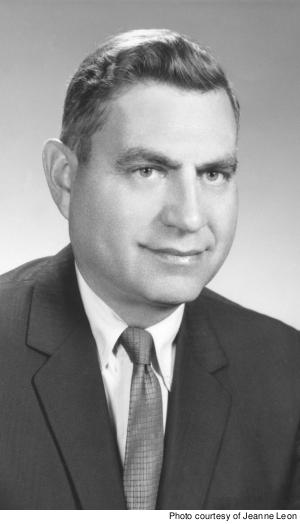Larry Kaplan built up institutions. Whether it was the economics department at John Jay, the PSC Retirees Chapter or a lobbying group for municipal retirees, he approached his task with poise, commitment and persistence. He died on August 5 at the age of 98.
Jack Judd, a former PSC Retirees chapter chair, first met Kaplan in 1967, when the two attended leadership meetings of the Legislative Conference, a predecessor of the PSC. Judd recalls Kaplan being especially interested in disability insurance and life insurance. This focus on bread-and-butter issues continued throughout his work as an activist. Kaplan’s approach of bringing people together for a common cause helped advance issues he was passionate about.
 |
“Larry never had an ill word to say about anybody, no matter how much he may have been in disagreement with that person,” Judd told Clarion. “He was always a gentlemen.”
Creating Structure
Kaplan grew up in Brooklyn where he attended high school in Coney Island. He received his bachelor’s degree in economics from Brooklyn College and his master’s in economics from Columbia University.
He fought in World War II from December 1942 to November 1945, serving in Army intelligence. He was with US troops in Battle of the Bulge, the deadliest World War II operation for Americans. In 1945, Kaplan was part of Allied forces that helped liberate the concentration camp at Buchenwald. Later in life, he was a member of many Jewish and veterans organizations, and pushed for building a World War II memorial in Manhasset, where he lived.
After earning his doctorate in economics from Columbia University, Kaplan worked for the federal government and then for the City of New York.
When John Jay college opened in 1965, he was invited to be a founding member of its economics department. He worked at CUNY for the next 30 years.
Upon retiring in 1986, Kaplan joined the PSC Retirees Chapter. During his 15 years in leadership positions, he reinvigorated a quiet chapter. He brought outside speakers to give presentations at meetings and started and edited a newsletter that featured informative articles on retiree benefits. He was also active in the PSC-CUNY Welfare Fund, serving as secretary and vice chair of the fund’s trustees.
In 1995, Kaplan wanted to unite retirees from municipal labor groups. “I realized that small groups cannot accomplish what a united organization can achieve,” Kaplan wrote in a reflection on his work. He went on to convene a meeting with several municipal labor unions, and that led to the founding of the Council of Municipal Retiree Organizations (COMRO), an organization that now advocates for more than a quarter million New York City municipal retirees.
Determined and Focused
Irwin Yellowitz, who served as Retiree Chapter chair after Kaplan, recalls City Hall demonstrations over cuts to Medicare Plan B. After the COMRO protests, the program was fully restored.
“When he had an idea in mind, he just kept on working at it until it was clear that he was going to get it,” Yellowitz told Clarion. “He was very focused. He wasn’t someone going off in five different directions.”
Kaplan is survived by his wife, Jeanne Leon, to whom he was married for 68 years, and his three children: Harriet Trackman, Sandford S. Kaplan and Marcia Pavone.

